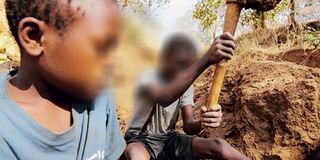Resource-rich Geita and the problem of school dropouts

A child miner at one of the sites in the Lake Zone region. PHOTO | FILE
What you need to know:
- Poverty has remained rampant in Tanzania’s resource-rich areas, leaving many children quitting classes to engage in income-generating activities\
Geita. The presence of income-generating activities such as mining and fishing in Geita Region is one of the major reasons for absenteeism in schools, where scores of children are tempted to drop and become self-employed, The Citizen can report.
A week-long survey in the rural suburbs of Nyan’gwale and Chato districts in the region has shown that poverty in many households has made it easier for parents and guardians to include their children in search of cash for a living and ignore the importance of education for their teenagers.
In one of the primary schools in Chato District (name withheld), the head teacher explains that more than 50 pupils drop out yearly due to poverty where teens employ themselves in fishing and agricultural activities.
“For many secondary school students, mining is their place of comfort, but for our case (primary), we lose up to 60 pupils who drop out every year, whenever we do some follow up, we find out that they go fishing using locally-made hooks and engage in agriculture,” the teacher explains.
Nzali Ligwa Nzali is a 13-year-old boy whose father left home while he (Nzali) was 11 years old (in 2020), leaving his three children and their mother, who works in farms as the family breadwinner.
Despite having a good ability in studies, according to his teachers, when Nzali reached Standard Five, he began to think of leaving school while giving the reason as his eye-problems as well as lacking the necessary learning materials and school uniforms due to poverty.
“The situation worsened and I decided to drop out and go fishing using a hook in the lake where I used to go at dawn and return home in the afternoon,” he explains.
This work was received with joy by his mother who saw that Nzali had already started to contribute to the family’s income by finding food and bringing in a little income through fish trade.
“I came back in the afternoon every day with no less than 20 fish, some of which we ate and sold the other. My mother was always happy because I helped her feed the family and she didn’t see the need for me to continue with school,” he explains.
Worse, after Nzali dropped out, her younger sister followed suit as she stayed at home to help her mother with house chores and farm works because at her age (seven years) she was not able to go fishing like her brother, Nzali did.
According to his head teacher, Nzali was the pupil the school was proud of due to his impressive performance since he entered Standard One, thus, as teachers, they were very upset when Nzali’s attendance started falling.
“In fact, many parents still do not consider education the best way of fighting poverty in their households. When we started to make a follow up on Nzali, we realized that his mother did not understand or see the need for her son to continue schooling because by that time he contributed to the family’s economy,” says the teacher. He continues to say that the understanding of the importance of education in the families of fishermen and farmers in the villages has been minimal or non-existent thus calling for more efforts to be initiated by the government and other development stakeholders.
“At the end of the day we were able to get Nzali back to school and this year we expect him to sit for Primary Schools Leaving Examination (PSLE) and we believe in his capabilities as he has been one of the best pupils with consistency in performance,” he said.
On the other hand, Elisha Masanja, 19, dropped out in 2020 and ran to the mine where he started working as a ‘hand boy’ in order to try his luck, but until today he has never found what he expected.
“I consulted with my parents to come here because there are many who have come here and have achieved well, so they convinced me to leave school and come to the mine though I haven’t yet succeeded as we expected,” he says.
“This job is difficult, there are times when I am bullied by my superiors, but I still encourage myself... I can’t go back to school because my thoughts right now are just looking for money,” he insists.
One of the leaders in the mine (name withheld) explains that there are a lot of teenagers entering the mine and the leadership has been trying to prevent it, but the culture of the parents has made the situation more difficult.
“We see these young people coming in disguise but there are times when we just let them experience the situation not as they expect... we would like them to go back to school if they are not studying and we will start chasing them away,” he says.
For her part, Nzali’s mother explains that hardship in life made her unable to encourage her son to study because at the end of the day there were things she would need to buy for him at a time that the condition could not allow.
“In my heart, I want my children to receive education, but their father ran away from them two years ago and he has never contributed anything, that’s why I thought it was best for Nzali to help me get food for the family,” she explains, noting that, however, she later understood and started encouraging her children to attend school.
Situation and solution
Geita is one of the leading regions for truancy in the country, ranking second for the absenteeism of primary and secondary school students, according to the region’s 2018 report.
The statistics of the region (then) showed that the attendance of students for the year 2017 averaged 90 percent while the drop out was 10 percent.
For those who completed primary education in 2017, it is 81 percent with a drop of 19 percent and for secondary schools it is 60 percent with a drop of 40 percent.
This reality led various organizations defending the rights of children and women to focus on their projects of saving children who dropped out to become self-employed in fishing and farming activities in the region.Plan International has been implementing a 3-year project for eliminating worst forms of Child Labour and other forms of violence against children in Geita Region (March 2020-February 2023).
As such, the organization launched intervention in the eradication of worst forms of child labour as well as violence against women and children in the region and this was how Nzali and others in the mining and farming sectors were rescued and encouraged to return to school.
After the efforts to find the leadership of Geita Region were proved futile, The Citizen managed to find one of the leaders in charge of education, who asked that his name be withheld because he was not a spokesperson, he said the situation was very bad as many children dropped out and became self-employed in the mines, restaurants, farming and fishing.
“Although I do not have complete statistics at the moment, the truth is that the situation is not encouraging and what we’re doing now is urging parents to be responsible while providing more education through ward education officers,” he said.




